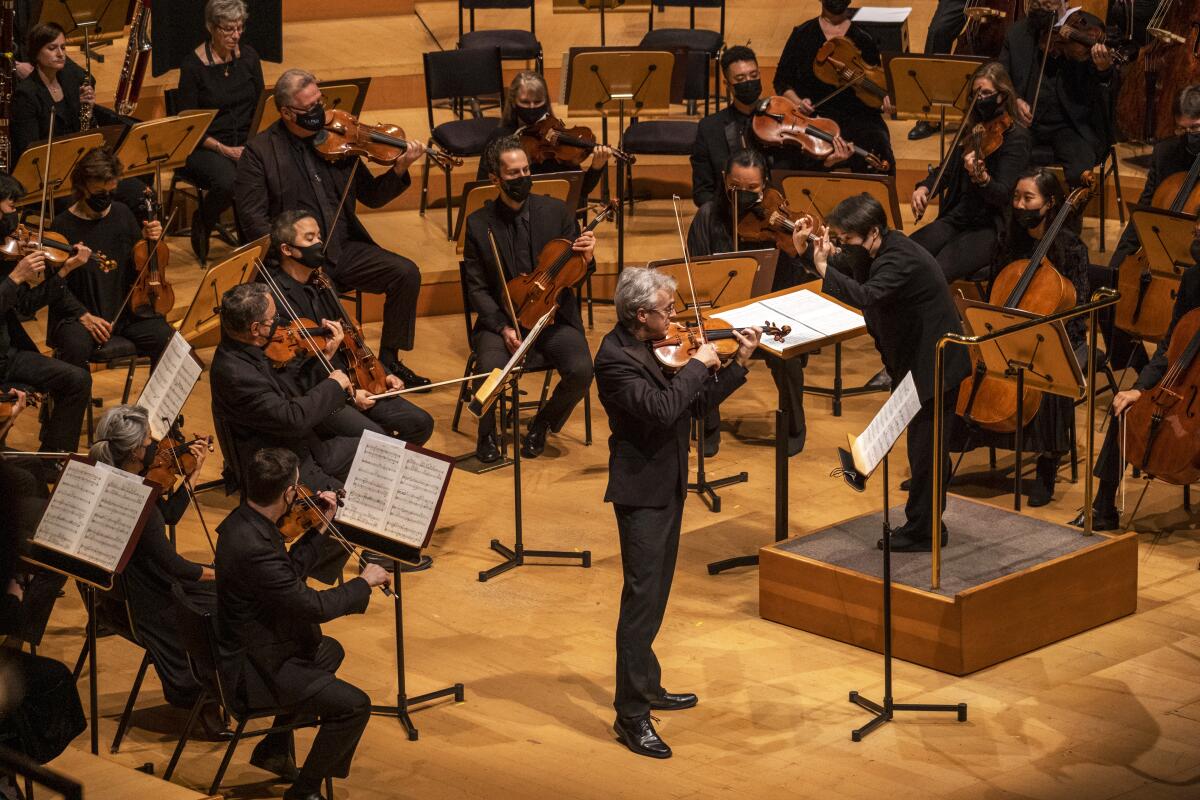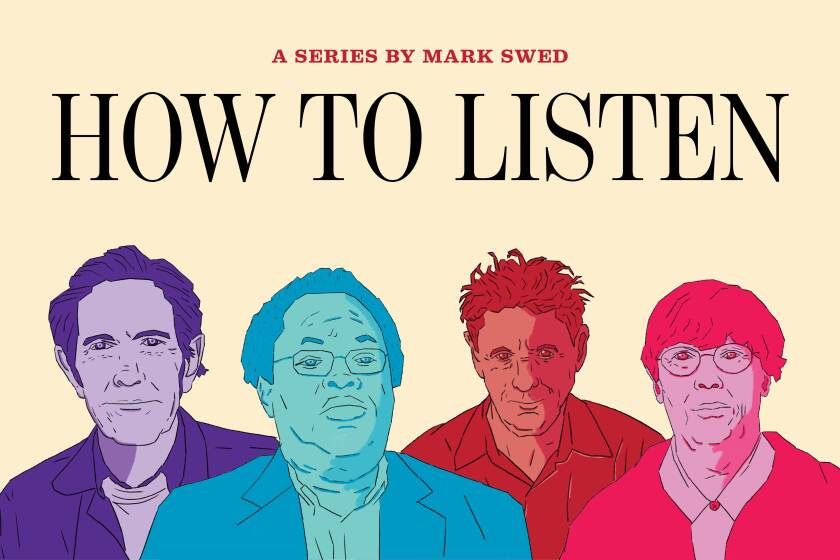Review: The Los Angeles Philharmonic closes out a pandemic year with messages of hope

Sunday afternoon the Los Angeles Philharmonic gave its last concert of a very confusing year. January 2021 produced the pandemic’s most troubling surge in L.A., but by the beginning of December, the L.A. Phil in Walt Disney Concert Hall was seemingly in its comfort zone.
Most remarkable of all, what to the rest of the orchestra world would seem a notable effort in promoting diversity is simply L.A. Phil business as usual. The program included new and recent music by women and featured a woman conductor, not to mention a composer of color. Julia Adolphe, whose violin concerto was commissioned for the occasion and featured concertmaster Martin Chalifour as soloist, as well as violist and composer Nokuthula Endo Ngwenyama — who is of Zimbabwean and Japanese descent — have been nurtured over the years by the orchestra and its players. The Chinese conductor, Xian Zhang, has been a familiar presence since 2015.
Comfort zone doesn’t necessarily mean comforting. The ambitious new concerto, titled “Woven Loom, Silver Spindle,” wasn’t exactly that, despite Adolphe’s stated intention of evoking “the delicacy and strength required of motherhood.” Nor was Zhang’s volcanic performance of Beethoven’s Seventh Symphony after intermission.
But the program did begin with Ngwenyama’s “Primal Message,” which should be the last word in comfort-giving. Originally written as a chamber piece in 2017, the brief score for strings, harp and percussion takes its inspiration from the “Arecibo” message, a friendly greeting from Earth to aliens sent from a radio telescope into outer space in 1974. Instead of a digital representation of our DNA, however, Ngwenyama seemed to wonder: What if our “primal message” were to be sheer gorgeousness?
More accurately, she wondered whether she might play around with some mathematical musical relationships and come up with a musical DNA map. Those rhythmic and melodic numerical manipulations sounded, if not primal, like meaningful little messages among the different string instruments, punctuated by harp and percussion, pervaded by sweetness. The sounds get along not necessarily through traditional harmonic consonance (although there is plenty of that), but through a kind of rightness of being.
“Primal Message” can turn a little soupy, but that hardly matters. Ngwenyama is showing our global good side to us, not the universe; her reason to save the planet being because we are, in fact, worth saving. Still, if whatever funny, advanced creatures that possibly inhabit globular cluster M13, where the original primal message is headed, somehow tune in to this musical version, there just might be hope.
Coronavirus may have silenced our symphony halls, taking away the essential communal experience of the concert as we know it, but The Times invites you to join us on a different kind of shared journey: a new series on listening.
Adolphe is also exploratory in “Woven Loom, Silver Spindle,” her third L.A. Phil commission (the premiere of her second, a cello concerto, fell victim to pandemic cancellations and will be rescheduled). In her new concerto, the solo violin sends out her own little messages, primal perhaps in their own right, to different instruments in the orchestra, which are more like feelers that set off a host of momentary repercussions.
The concerto begins with tentative pizzicati. A plucked solo violin amid orchestral mists, the rustles and some glitter from a distant piano ends 20 minutes later in soft, ethereal shimmer. Once the initial fog lists, the violin gingerly suggests melodic shards of ever-varying character. A solo cello takes the bait and enters into a brief dialogue. A bassoon and groups of winds take their turns interacting. Metallic percussion has a say.
Now and then the symbols of loom and spindle do act as musical metaphors. The violin spins, the orchestra interlaces musical threads and occasionally looms over the soloist. But the messages remain fragmentary, rather than weave, the value being in the exploration rather than fulfillment.
For this, Adolphe has the perfect protagonist in Chalifour. He makes “silver spindle” audible, gleaming through an orchestra that has long known him and he, it. There can hardly be anyone in the L.A. Phil with whom he has not played chamber music, which makes every interaction in Adolphe’s concerto feel like fascinating conversation.
If Zhang remained an enthusiastic, detail-oriented facilitator of “Primal Message” and “Woven Loom,” she became the astonishing primal messenger of Beethoven’s Seventh. She used a big orchestra, produced a big sound and did so with overwhelming energy. In even the dullest of hands, Beethoven’s symphony is a rhythm machine. In Zhang’s dancing hands, phrases swelled and dotted rhythms quickened with propulsive force, sonic gravity be damned.
COVID-19 restrictions require L.A. Phil players who can to wear masks while playing. Conductors, who depend on facial expressions, are typically excepted. Zhang kept hers on. Her arms vehemently swooped like that of a Prospero commanding the weather. She needed nothing more.
If a symphony could be a space ship launched into space with a primal message, this Beethoven Seventh was it. The orchestra played gloriously and looked happily dazed afterward, which may well sum up its past year. Comfort zone. What’s that?
More to Read
The biggest entertainment stories
Get our big stories about Hollywood, film, television, music, arts, culture and more right in your inbox as soon as they publish.
You may occasionally receive promotional content from the Los Angeles Times.












